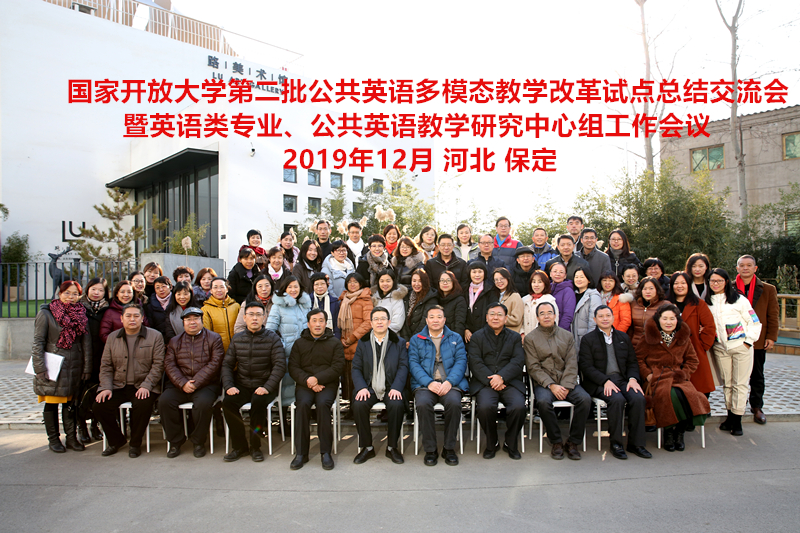 From 20-22 December 2019, a meeting to summarise the second batch of pilot programs for multimodal teaching reform in Public English at the Open University of China (OUC), as well as a work meeting for the central teaching and research group of English majors and public English were held in Baoding City, Hebei Province. Yang Xiaotang, vice president of the OUC, and the directors responsible for teaching in relevant branches attended the meeting, which was presided over by Liu Zhanrong, director of the Faculty of International Languages and Cultures.
From 20-22 December 2019, a meeting to summarise the second batch of pilot programs for multimodal teaching reform in Public English at the Open University of China (OUC), as well as a work meeting for the central teaching and research group of English majors and public English were held in Baoding City, Hebei Province. Yang Xiaotang, vice president of the OUC, and the directors responsible for teaching in relevant branches attended the meeting, which was presided over by Liu Zhanrong, director of the Faculty of International Languages and Cultures.

Yang Xiaotang pointed out that over the past 40 years, the open university system has been entrusted with the responsibility of open education in China. Within the open university governance system, the core element is quality, teaching is the key, and management is the most difficult part. We should adhere to a problem-based approach, focus on quality standards, social recognition, and student satisfaction, unite teachers, leverage the role of the central teaching and research group, and explore the popularisation and replicability of the teaching reform model.
The meeting summarised the work of the central teaching and research group for English majors and public English, reviewed the construction process of the central group, and laid out the faculty's key teaching work. During the meeting, it was pointed out that in the next stage, close attention should be paid to quality awareness and effort should be concentrated on deepening the reform of the teaching model for public English courses and promoting the upgrading of the training program for English majors.
The meeting summarised the general situation of the multimodal teaching reform of public English and described its significance and measures. Its outstanding achievements were established and emphasis was placed on doing a good job in the summary, publicity, promotion, and implementation of the reform.
Liu Yongquan, Professor of the Faculty of International Languages and Cultures, gave a special report on teaching reform entitled “The Construction of an Open Model of Public English in Open Universities from a Multimodal Perspective,” which systematically explained the background, concept, and theoretical basis of teaching reform, proposed the "Open model”, and proposed shifting the focus of teaching to oral English training, strengthening multi interactions (practice), infusing evaluation into the teaching process, and exploring the construction of online teaching teams.
The central teaching and research group completed the work for new and old members and discussed the direction of development for the major. The teachers said that the curriculum of English majors should not only be well grounded, but also highlight the characteristics of the OUC and meet the needs of the society. It also stated that efforts should be spent on quality, in order to cultivate professionals in line with the direction of social development.
Teaching representatives from eight pilot units of the second batch of multimodal teaching reform for Public English reported their experiences. This round of pilot teaching reform has adopted online, mobile, and mixed teaching models. It fully combined diverse resources such as online core courses and the open cloud library, and used auxiliary methods such as live classrooms and WeChat mini programmes to promote the formation of English learning habits for students, effectively improve their academic performance, create a good learning atmosphere and campus culture, and stimulate students' lifelong learning potential.
Feng Lin, editor in chief of Distance Education in China magazine, Xu Huifu, director of the editorial department of Open Education Research, and Ye Huijun, dean of the School of Foreign Languages, Hebei University, gave special reports on scientific research methods, thesis writing, and the construction experience of the college English major.
The Baoding branch school of the OUC’s Hebei Branch demonstrated the English achievements of students in the pilot programme in the form of an evening party and the other experimental units demonstrated their results in the form of videos, including choruses, solos, dubbing, sitcoms, and poetry recitation in English.
By Liu Ning, OUC